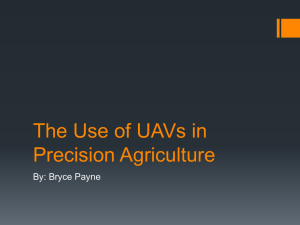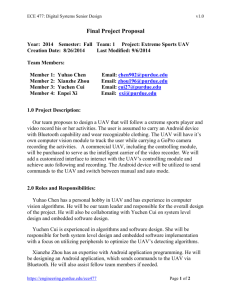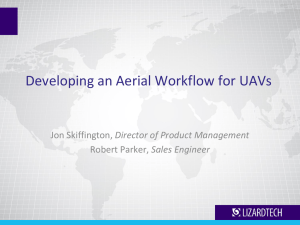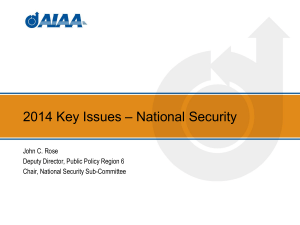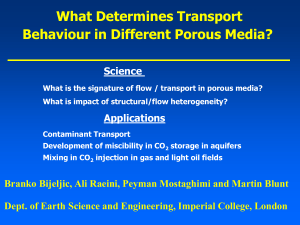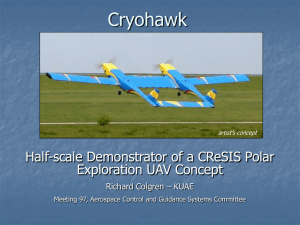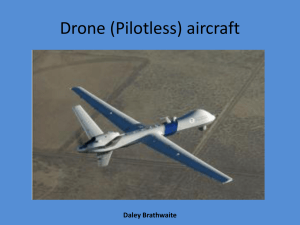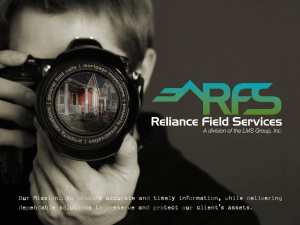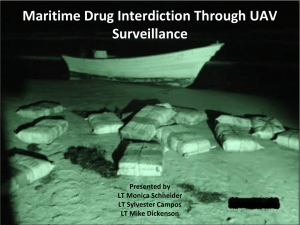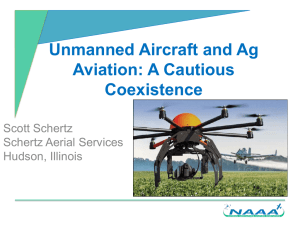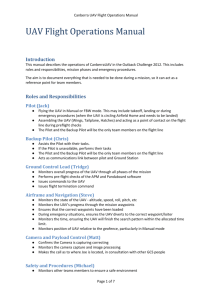Property Asset Solutions
advertisement
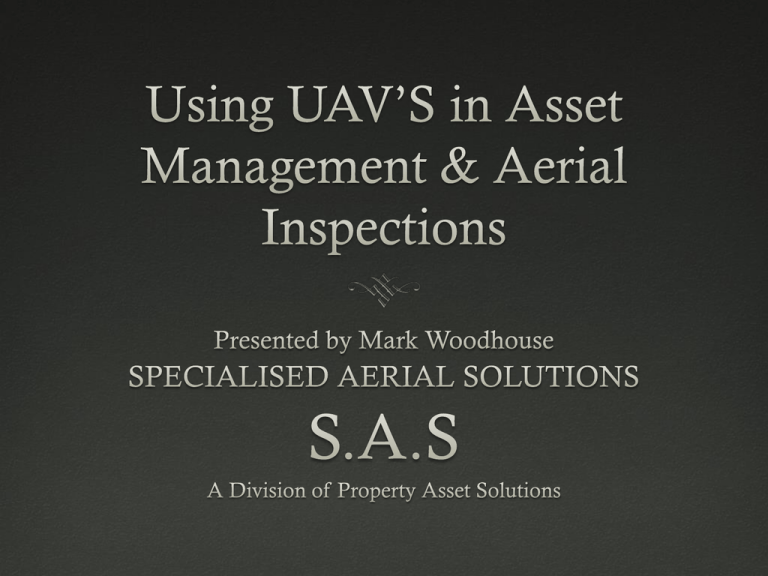
What is a UAV? An (Unmanned Aerial Vehicle) or commonly know as a Drone Multi Rotary with Digital camera vertical lift off/horizontal flight in all directions; think Helicopter Fixed Winged UAV conventional take off, climb to programmed height, will fly to programmed mission SPECIALISED AERIAL SOLUTIONS UAV Operators are:- Civil Aviation Authority certified & regulated Operators are fully insured Have a working knowledge of buildings & infrastructure Experienced Asset Surveyors Features of a UAV “Rotary” • Light weight • Fitted with a HD camera • Multiple blades provide a stable platform • Battery powered – no liquid fuels • Quiet operation – less disruption • Records video footage and still photography • Transportable to any site or location • Fast set up and flying within minutes Benefits of using a UAV • Improves safety no need to put people in unsafe situations • Reduces costs, no need for costly scaffold or platform machinery • Saves time, in the air in minutes • Able to cover large areas in relatively short time periods or focus on particular areas • Ability to view live video feeds, limit costly shut downs • Engineers and Asset Managers can view in live time • Direct UAV operator to specific areas of interest • Identify defects and abnormalities for instant analysis • Video and stills photography can be stored as files UAV APPLICATIONS Engineering & Construction Asset & Plant Inspections Infrastructure Inspections Power Line Inspections Environmental Monitoring Emergency Services Surveying & Mapping Thermographic Imaging Industrial Roof Inspections UAV APPLICATIONS Civil Works Monitoring Property Development Real Estate Photography Aerial Photography/Videography Promotional Videos Film & Advertising Works Agricultural Monitoring Engineering & Construction UAV aerial photography is regularly used for project progress reporting on commercial projects. As the UAV is guided to specific viewpoints in the sky, engineers and site managers can monitor and control what the camera is viewing, enabling them to select the exact photos or video they wish to capture. Asset & Plant Inspection The safety of all employees in any situation is the most important consideration. UAV’s can be sent in to do the dangerous and risky inspection tasks that would otherwise have to be done by a person. This removes the possibility of someone being injured or killed in high risk situations. Such situations may include, communication towers, buildings, cooling towers, flare stacks, dams. Aerial Inspections The advantage of using a UAV, it causes no disruption to operations, it only requires a few square meters for launch and retrieval - often working from the perimeter of a customers site. Due to the precision control and light weight construction of a UAV it can operate up close to subjects, gaining a better view without compromising safety or property. The ability to conduct such highly detailed asset inspections from the air is unique providing a safer, more cost effective and timely outcome for customers. Facilities that can be assessed by UAV’s Cooling towers Bridges (from above and below) Dams / Water Resources / Pipe Lines / Utilities Buildings / Open Spaces / Sports & Recreational sites Chemical plants and refineries - (flare stacks) Off shore activities (oil & gas platforms and pipelines) Mining infrastructure Wind turbines Weather & communication towers Environmental Monitoring The environment is continuously changing along with its related issues. UAV’s provide a unique service that will allow you to monitor and assess the environment in a cost effective and simple manner. This is particularly useful for councils and government departments that need small areas assessed regularly without the complications of engaging full sized aircraft. Industrial Roof Inspections Many factories, warehouses and industrial sites have premises with very large roofs that are either difficult to access or not safe to walk on - yet must be regularly inspected. Engineers and Asset Managers can view these areas in live time and direct the UAV operator to specific areas of interest. Thus identifying defects, deterioration and abnormalities for instant analysis. Industrial Roof Inspections Site owners are responsible for the safety of contractors hired to conduct inspections of their plant and or roofs. If roofs are unsafe to walk on, the only realistic way to inspect the condition previously was by mobile crane - with personnel leaning out of crane baskets to try and look at plant, roof materials, flashing, vents, gutters, chimneys for general deterioration. UAV inspections offer four major advantages to asset managers and engineers: It is much safer (no personnel need to work at heights) It's much quicker (what can often take up to a number of days for a crane or platform to do can often be accomplished in a day using a UAV) It's more convenient and causes no disruption to site operations Typically, with less time comes significantly less cost Thermographic Imaging Infrared cameras measure the thermal energy emitted from an object. The higher the object’s temperature, the greater the IR radiation emitted. This is useful in the inspection of roofs & buildings, power lines, sub stations and plant & machinery. With building and roof inspections, often hot spots mean escaping heat. As with plant & machinery, hot spots can potentially lead to a problem. If viewed earlier enough costly repairs and shut downs can be averted. Summarising the benefits of using a UAV Improves safety no need to put people in unsafe situations Saves time, reduces costs Ability to view live video feeds, limit costly shut downs Direct the UAV operator to specific areas of interest View back videos to identify defects and abnormalities for instant analysis Transportable and up and flying within minutes
